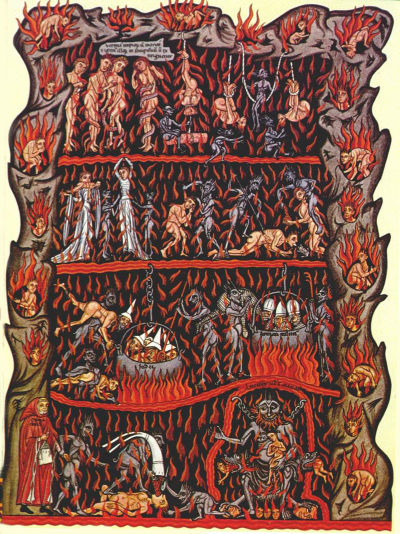Is Hell real? How could a loving God send anyone there?

Remember the Y2K scare?
One such issue had nothing to do with computers. How many times have you been to a cemetery and seen headstones already in place for the spouse of the deceased, with the birth year followed by 19–? Assuming the person lives another four months, what was to be done?
Some monument companies tried to create epoxies to fill in the numbers but without much luck. Others had no idea what they would do. One person said, Just fill in 1999 + 1, or 2 or 3, or whatever.
It was a Y2K problem etched in stone.
I don’t know when you and I will die, but I do know that we will, unless Jesus comes back first. When that happens, where do we go?
I’ve written about heaven; now we’ll consider the other place. I pray that this is the closest you’ll get to going there.
A hellish parable
Jesus’ most hellish parable (Luke 16:19-31) contains two characters: a rich man and a very poor beggar. At opposite ends of the spectrum, here and in eternity. Here’s how the story goes.
We meet the rich man first. A very rich man. And religious as well. He is “dressed in purple and fine linen.” This means that his outer robe was dyed purple while his inner robe was made of Egyptian woven linen. Jesus is literally describing the costliest clothing of his day—a $2,000 suit, we’d say.
He “lives in luxury every day.” The Greek says that he lives lampros, brilliantly, magnificently. Clearly, he is one of the leading social figures of his time, well known and popular.
And he is obviously an observant Jew, calling out to “Father Abraham” (v. 24) as did the pious Jews of his day. No lawbreaking is mentioned here. Obviously he is a typically religious man. Rich and religious.1
Our other character is “a beggar named Lazarus.” His name, ironically, means “God helps.” He is the only named character in all of Jesus’ parables. Society knew the rich man’s name, but we don’t. No one knew the beggar’s name, but we do. So does God.
He is “laid” at the gate (v. 20). The Greek says he’s “thrown there.” He’s “covered with sores.” Luke uses a medical term here, perhaps for bedsores because of his crippled condition. As a result, Lazarus is starving. “Longing to eat” means “longing without satisfaction.” People in Jesus’ day didn’t have paper or cloth napkins; they would wipe their hands on bread, then throw it out. He longs to eat these scraps but is refused. Instead, the dogs eat them. Then they lick his sores. What a horrible life! But a realistic portrayal of many in Jesus’ day.
Now comes the first surprise in our story: Lazarus goes to heaven. No burial is mentioned. Likely, his body is thrown outside the city on the trash heap known as Gehenna,2 where refuse was constantly burning. But not his soul: he is at “Abraham’s side,” a Jewish idiom for heaven. He is carried there by the angels, in one of the greatest funeral processions of all time.
Then comes the second, even greater surprise: the rich man goes to hell. In Jesus’ day riches were a sure sign of God’s blessing. But Jesus had just said, “You cannot serve both God and Money” (16:13). And the Pharisees, who loved money, sneered at him (v. 14).
Now the rich man is buried, undoubtedly with much ceremony and speech-making. A vivid contrast to Lazarus’ body lying on the trash heap. Then comes the great irony: Lazarus’ body is on literal Gehenna, but the rich man’s soul is in eternal Gehenna, hell, a place of great “torment” (v. 23). Forever.
From Jesus’ sobering story we discover several crucial facts:
- Our souls do not die with our bodies.
- Our souls are conscious after death.
- The righteous are taken to a place of happiness immediately at death while the wicked are consigned at once to punishment.
- Wealth does not keep us from death or hell.
- There is a place of suffering beyond the grave–a hell.
- There is never any escape or end to hell.
- God gives us sufficient warning to prepare for death.
- And God will give us nothing further to warn us.3
Now, from Jesus’ story, let’s ask some questions.
What is hell like?
1. What is hell?
It is a real place, mentioned twenty-three times in the New Testament, fifteen times by Jesus himself. Jesus calls it a place of “torment” (v. 23). Hell is real, despite its unpopularity today. Sixty-two percent of all Americans, including 52 percent of born-again Christians, say that Satan does not exist. Only 4 percent of all Americans are worried about going to hell. But our ignorance and deceit do not change the fact that hell is real.
God’s Word often describes hell as “fire” (v. 24). Jesus said, “The angels will come and separate the wicked from the righteous and throw them into the fiery furnace, where there will be weeping and gnashing of teeth” (Matthew 13:49-50). Jude 7 calls hell “the punishment of eternal fire.” Revelation 14:10 says, “He will be tormented with burning sulfur in the presence of the holy angels and of the Lamb. And the smoke of their torment rises forever and ever.” And Revelation 20:15 calls hell “the lake of fire.”
Third, hell is called “darkness”: “Then the king told the attendants, ‘Tie him hand and foot, and throw him outside, into the darkness, where there will be weeping and gnashing of teeth” (Matthew 22:13; cf. Jude 6). Fourth, using language from the literal trash heap Gehenna, Jesus said, “Their worm does not die, and the fire is not quenched” (Mark 9:49; cf. Isaiah 66:24).
Most of all, hell is separation from God (Luke 16:26). Remember Jesus’ warning: “I will tell them plainly, ‘I never knew you. Away from me, you evildoers’” (Matthew 7:23). And hell is permanent (v. 26); it is the “second death” (Revelation 20:14).
2. Is hell a literal place?
Yes.
Now, most interpreters see the descriptions as intentionally symbolic but descriptions of a literal place and reality. Calvin,4 Luther, J. I. Packer, C. S. Lewis, and Billy Graham all see these pictures as symbolic5 of a literal reality. We know that those in hell cannot literally see those in heaven. Hell is described as “darkness” in Jude 6 yet a “fiery furnace” in Jude 7. Physical fire only works on physical bodies, yet Matthew 25:41 teaches that the eternal fire was first created for spirit beings like the devil and his angels.
But please don’t miss the point: hell is terrible.
Jesus used the worst pictures he could find. The point is, you do not want to go there or let anyone you know go there! To be absent from God, and from all that is good, for all eternity? That is hell.
3. Who goes there?
From our parable, we see that those who refuse to repent (v. 30), who refuse God’s word and revelation (v. 31), go to hell. Jesus was clear: he is the way, truth, and life; no one goes to the Father except through him. Those who refuse Jesus’ offer of eternal life choose hell instead. The word of God is nonnegotiable: those whose names are not found written in the “Lamb’s book of life” are cast into the lake of fire (Revelation 20.15).
4. When do they go to hell?
Our parable makes clear that they are punished immediately. Then they are condemned to eternal hell at the final judgment: “This is how it will be at the end of the age,” Jesus says (Matthew 13:49), then he describes “the fiery furnace.” Paul taught the same (2 Thessalonians 1:9-10): “They will be punished with everlasting destruction and shut out from the presence of the Lord and from the majesty of his power on the day he comes to be glorified in his holy people and to be marveled at among all those who have believed.” When they stand before God in the final judgment, “If anyone’s name was not found written in the book of life, he was thrown into the lake of fire” (Revelation 20:15).
This is an actual reality. Dr. Charles Garfield has done extensive research with those who died physically and were brought back to life medically. His results: “Almost as many of the dying patients interviewed reported negative visions (demons and so forth), as reported blissful experiences.”6
Dr. Maurice Rawlings tells about one of his patients, a man who died three times. At his first death he saw things so horrible that he experienced a religious conversion. His second clinical death, some days later, produced a wonderful, heavenly experience. At his third and final death, he was the one reassuring his doctor.7
5. Is hell fair?
The rich man in our story never protests. He knows he deserves to go there. Dr. Rawlings found the same with patients who went to hell then were resuscitated: not one of them thought this was unfair. Every one knew he or she deserved to go to hell.
Instead, the rich and religious man wants to spare his brothers, for they deserve to go there as well. Those in hell would make the greatest evangelists on earth.
The fact is, heaven is a perfect place. One sin would ruin it. So Jesus died to pay for our sins, to cleanse us from them. But if we refuse his salvation, we must pay for them ourselves. This means that we are unable to come into the presence of God, forever.
I especially appreciate the way Calvin Miller puts it: “God, can you be merciful and send me off to hell and lock me in forever?”
“No, Pilgrim, I will not send you there, but if you chose to go there, I could never lock you out.”8
Conclusion
So, we have learned important facts today.
1. Hell matters, for it is eternal.
The early theologians had the best illustration of eternity. Imagine a hummingbird, flying from earth to the moon, picking up a grain of moon dust, and returning to deposit it on the earth, once every thousand years. How long would it take the hummingbird to move the entire moon to the earth?
When it is finished, eternity has just begun.
2. You must be saved today.
This is the only chance to trust in Jesus you know you’ll have. I cannot promise you another; neither will God.
3. You must bring someone else with you.
If I have the cure for cancer and will not give it to people dying of the disease, only two reasons could explain my behavior. Either I don’t believe people will die, or I don’t care. Scripture excludes the first reason, leaving only the second.
William Booth, the founder of the Salvation Army, once took a group of volunteers through an extensive training course lasting many weeks. When it was done, he said to them, “I’m sorry our training took so long. If I could take you to hell for five minutes, none of what I’ve taught you would be necessary.” He was right.
We’ve been to hell through God’s word today.
Now, do whatever you must not to go there, or let someone else go there tomorrow.
Originally posted at Denison Forum.
Endnotes
1. Martin Luther thought that since Jesus’ story gives us such details as the kind of clothes he wore, it would have pointed out any glaring illegalities in his lifestyle as well. See Martin Luther, Sermons of Martin Luther, ed. John Nicholas Lenker, trans. John Nicholas Lenker and others (Grand Rapids: Baker, 1989) 4:19.
2. 2 Kings 23:10; Jeremiah 7:32; 2 Chronicles 28:3; 33:6; Matthew 18:9; Mark 9:43, 45, 47; James 3:6.
3. Cf. Barnes’ Notes 9.118-9.
4. John Calvin, Institutes 3.25.12.
5. See Four Views on Hell, ed. William Crockett (Grand Rapids: Zondervan, 1992) 30-1; 44-5; 61-2.
6. Maurice S. Rawlings, M.D., To Hell and Back (Nashville: Nelson, 1993) 73.
7. Ibid., 76.
8. Calvin Miller, The Singer (Downers Grove, Illinois: IVP, 1979) 129.




























